- Home
- James McBride
The Good Lord Bird
The Good Lord Bird Read online
ALSO BY JAMES MCBRIDE
The Color of Water
Miracle at St. Anna
Song Yet Sung
RIVERHEAD BOOKS
Published by the Penguin Group
Penguin Group (USA), 375 Hudson Street,
New York, New York 10014, USA
USA • Canada • UK • Ireland • Australia • New Zealand • India • South Africa • China
Penguin Books Ltd, Registered Offices:
80 Strand, London WC2R 0RL, England
For more information about the Penguin Group visit penguin.com
Copyright © 2013 by James McBride
All rights reserved. No part of this book may be reproduced, scanned, or distributed in any printed or electronic form without permission. Please do not participate in or encourage piracy of copyrighted materials in violation of the author’s rights. Purchase only authorized editions.
Published simultaneously in Canada
Library of Congress Cataloging-in-Publication Data
McBride, James, date.
The good lord bird / James McBride.
p. cm.
ISBN 978-1-101-61618-5
1. Fugitive slaves—United States—Fiction. 2. Brown, John, 1800–1859—Fiction. 3. Abolitionists—Fiction. 4. Harpers Ferry (W. Va.)—History—John Brown’s Raid, 1859—Fiction. I. Title.
PS3613.C28G66 2013 2013004014
813'.6—dc23
This is a work of fiction. Names, characters, places, and incidents either are the product of the author’s imagination or are used fictitiously, and any resemblance to actual persons, living or dead, businesses, companies, events, or locales is entirely coincidental.
FOR MA AND JADE,
WHO LOVED A GOOD WHOPPER
Contents
Also by James McBride
Title Page
Copyright
Dedication
PROLOGUE
PART I: FREE DEEDS (Kansas)
1. Meet the Lord
2. The Good Lord Bird
3. The Old Man’s Army
4. Massacre
5. Nigger Bob
6. Prisoner Again
7. Black Jack
8. A Bad Omen
9. A Sign from God
PART II: SLAVE DEEDS (Missouri)
10. A Real Gunslinger
11. Pie
12. Sibonia
13. Insurrection
14. A Terrible Discovery
15. Squeezed
16. Busting Out
PART III: LEGEND (Virginia)
17. Rolling into History
18. Meeting a Great Man
19. Smelling Like Bear
20. Rousing the Hive
21. The Plan
22. The Spy
23. The Word
24. The Rail Man
25. Annie
26. The Things Heaven Sent
27. Escape
28. Attack
29. A Bowl of Confusion
30. Un-Hiving the Bees
31. Last Stand
32. Getting Gone
Acknowledgments
Prologue
Rare Negro Papers Found
by A. J. Watson
Wilmington, Del. (AP) June 14, 1966—A fire that destroyed the city’s oldest Negro church has led to the discovery of a wild slave narrative that highlights a little-known era of American history.
The First United Negro Baptist Church of the Abyssinia at 4th and Bainbridge Streets was destroyed by fire last night. Fire officials blamed a faulty gas heater. No one was injured in the blaze. But among the scorched remains were several charred notebooks belonging to a late church deacon that have attracted national academic interest.
Charles D. Higgins, a congregation member since 1921, died last May. Higgins was a cook, but also an amateur historian who apparently recorded the account of another elderly United Baptist congregation member, Henry “the Onion” Shackleford, who claimed to have been the only Negro to survive the American outlaw John Brown’s raid on Harpers Ferry, Va., in 1859. Brown, a white abolitionist, attempted to capture the nation’s largest arsenal to start a war on slavery. The failed raid caused a national panic and prompted the start of America’s Civil War. It led to Brown’s hanging, as well as the deaths of most of his 19 accomplices, including four Negroes.
Until now, no full account of Brown or of his men has ever been found or known to exist.
The account was contained in a metal fireproof box hidden under the floorboards of the deacon’s chair behind the pulpit, where Higgins held court faithfully every Sunday for more than 43 years. Also in the box was an envelope containing 12 Confederate dollars, a rare feather from an ivory-billed woodpecker, a nearly extinct bird species, and a note from Mr. Higgins’s late wife which read, “If I ever see you again, I’ll send your ass hooting and hollering out my damn door.”
Mr. Higgins had no children. He worked as a cook for Mrs. Arlene Ellis of Chadds Ford, Pa., for 29 years. He was the eldest member of the First United Baptist, where he was known affectionately to congregation members as “Mr. Whopper” and “Deacon Shimmy Wimmy.” His exact age at his death was unknown, but congregation members guessed it at close to 100. He was also something of an attraction at local city council meetings, where he often attended sessions dressed in Civil War regalia and petitioned the council to rename the Dupont Highway the “John Brown Road.”
His neatly bound notebooks claim that he gathered the facts of Mr. Shackleford’s life in a series of interviews conducted in 1942. According to Mr. Higgins, he first made the acquaintance of Mr. Shackleford when they both served as Sunday school teachers at First United in the early ’40s, until Shackleford was tossed from the church in 1947 for what Mr. Higgins writes as “scoundreling and funny-touching a fast li’l something named Peaches. . . .”
Apparently, according to Mr. Higgins’s papers, the church members believed Mr. Shackleford was a woman before that incident. He was apparently a small man, according to Mr. Higgins, “with girly features, curly hair . . . and the heart of a rascal.”
Mr. Higgins claims Mr. Shackleford was 103 years old when the account was recorded, though he writes, “It could be more. Onion had me by at least 30 years.”
While Mr. Shackleford is listed in the 1942 church registry, which survived the fire, no one in the current congregation is old enough to recall him.
The congregation has announced plans to pass the account of Mr. Shackleford to a Negro history expert for verification, and later sell the notebooks for publication, with the proceeds going toward the purchase of a new church van.
PART I
FREE DEEDS
(Kansas)
I
Meet the Lord
I was born a colored man and don’t you forget it. But I lived as a colored woman for seventeen years.
My Pa was a full-blooded Negro out of Osawatomie, in Kansas Territory, north of Fort Scott, near Lawrence. Pa was a barber by trade, though that never gived him full satisfaction. Preaching the Gospel was his main line. Pa didn’t have a regular church, like the type that don’t allow nothing but bingo on Wednesday nights and women setting around making paper-doll cutouts. He saved souls one at a time, cutting hair at Dutch Henry’s Tavern, which was tucked at a crossing on the California Trail that runs along the Kaw River in south Kansas Territory.
Pa ministered mostly to lowlifes, four-flushers, slaveholders, and drunks who came along the Kansas Trail. He weren’t a big man in size, but he dressed big. He favored a top hat, pants th
at drawed up around his ankles, high-collar shirt, and heeled boots. Most of his clothing was junk he found, or items he stole off dead white folks on the prairie killed off from dropsy or aired out on account of some dispute or other. His shirt had bullet holes in it the size of quarters. His hat was two sizes too small. His trousers come from two different-colored pairs sewn together in the middle where the arse met. His hair was nappy enough to strike a match on. Most women wouldn’t go near him, including my Ma, who closed her eyes in death bringing me to this life. She was said to be a gentle, high-yaller woman. “Your Ma was the only woman in the world man enough to hear my holy thoughts,” Pa boasted, “for I’m a man of many parts.”
Whatever them parts was, they didn’t add up to much, for all full up and dressed to the nines, complete with boots and three-inch top hat, Pa only come out to ’bout four feet eight inches tall, and quite a bit of that was air.
But what he lacked in size, Pa made up for with his voice. My Pa could outyell with his voice any white man who ever walked God’s green earth, bar none. He had a high, thin voice. When he talked, it sounded like he had a Jew’s harp stuck down his throat, for he spoke in pops and bangs and such, which meant speaking with him was a two-for-one deal, being that he cleaned your face and spit-washed it for you at the same time—make that three-for-one, when you consider his breath. His breath smelled like hog guts and sawdust, for he worked in a slaughterhouse for many years, so most colored folks avoided him generally.
But white folks liked him fine. Many a night I seen my Pa fill up on joy juice and leap atop the bar at Dutch Henry’s, snipping his scissors and hollering through the smoke and gin, “The Lord’s coming! He’s a’comin’ to gnash out your teeth and tear out your hair!” then fling hisself into a crowd of the meanest, low-down, piss-drunk Missouri rebels you ever saw. And while they mostly clubbed him to the floor and kicked out his teeth, them white fellers didn’t no more blame my Pa for flinging hisself at them in the name of the Holy Ghost than if a tornado was to come along and toss him across the room, for the Spirit of the Redeemer Who Spilt His Blood was serious business out on the prairie in them days, and your basic white pioneer weren’t no stranger to the notion of hope. Most of ’em was fresh out of that commodity, having come west on a notion that hadn’t worked out the way it was drawed up anyway, so anything that helped them outta bed to kill off Indians and not drop dead from ague and rattlesnakes was a welcome change. It helped too that Pa made some of the best rotgut in Kansas Territory—though he was a preacher, Pa weren’t against a taste or three—and like as not, the same gunslingers who tore out his hair and knocked him cold would pick him up afterward and say “Let’s liquor,” and the whole bunch of ’em would wander off and howl at the moon, drinking Pa’s giddy sauce. Pa was right proud of his friendship with the white race, something he claimed he learned from the Bible. “Son,” he’d say, “always remember the book of Heziekial, twelfth chapter, seventeenth verse: ‘Hold out thy glass to thy thirsty neighbor, Captain Ahab, and let him drinketh his fill.’”
I was a grown man before I knowed there weren’t no book of Heziekial in the Bible. Nor was there any Captain Ahab. Fact is, Pa couldn’t read a lick, and only recited Bible verses he heard white folks tell him.
Now, it’s true there was a movement in town to hang my Pa, on account of his getting filled with the Holy Ghost and throwing hisself at the flood of westward pioneers who stopped to lay in supplies at Dutch Henry’s—speculators, trappers, children, merchants, Mormons, even white women. Them poor settlers had enough to worry ’bout what with rattlers popping up from the floorboards and breechloaders that fired for nothing and building chimneys the wrong way that choked ’em to death, without having to fret ’bout a Negro flinging hisself at them in the name of our Great Redeemer Who Wore the Crown. In fact, by the time I was ten years old in 1856, there was open talk in town of blowing Pa’s brains out.
They would’a done it, I think, had not a visitor come that spring and got the job done for ’em.
Dutch Henry’s sat right near the Missouri border. It served as a kind of post office, courthouse, rumor mill, and gin house for Missouri rebels who come across the Kansas line to drink, throw cards, tell lies, frequent whores, and holler to the moon ’bout niggers taking over the world and the white man’s constitutional rights being throwed in the outhouse by the Yankees and so forth. I paid no attention to that talk, for my aim in them days was to shine shoes while my Pa cut hair and shove as much johnnycake and ale down my little red lane as possible. But come spring, talk in Dutch’s circled ’round a certain murderous white scoundrel named Old John Brown, a Yank from back east who’d come to Kansas Territory to stir up trouble with his gang of sons called the Pottawatomie Rifles. To hear them tell it, Old John Brown and his murderous sons planned to deaden every man, woman, and child on the prairie. Old John Brown stole horses. Old John Brown burned homesteads. Old John Brown raped women and hacked off heads. Old John Brown done this, and Old John Brown done that, and why, by God, by the time they was done with him, Old John Brown sounded like the most onerous, murderous, low-down son of a bitch you ever saw, and I resolved that if I ever was to run across him, why, by God, I would do him in myself, just on account of what he done or was gonna do to the good white people I knowed.
Well, not long after I decided them proclamations, an old, tottering Irishman teetered into Dutch Henry’s and sat in Pa’s barber chair. Weren’t nothing special ’bout him. There was a hundred prospecting prairie bums wandering around Kansas Territory in them days looking for a lift west or a job rustling cattle. This drummer weren’t nothing special. He was a stooped, skinny feller, fresh off the prairie, smelling like buffalo dung, with a nervous twitch in his jaw and a chin full of ragged whiskers. His face had so many lines and wrinkles running between his mouth and eyes that if you bundled ’em up, you could make ’em a canal. His thin lips was pulled back to a permanent frown. His coat, vest, pants, and string tie looked like mice had chewed on every corner of ’em, and his boots was altogether done in. His toes stuck clean through the toe points. He was a sorry-looking package altogether, even by prairie standards, but he was white, so when he set in Pa’s chair for a haircut and a shave, Pa put a bib on him and went to work. As usual, Pa worked at the top end and I done the bottom, shining his boots, which in this case was more toes than leather.
After a few minutes, the Irishman glanced around, and, seeing as nobody was standing too close, said to Pa quietly, “You a Bible man?”
Well, Pa was a lunatic when it come to God, and that perked him right up. He said, “Why, boss, I surely is. I knows all kinds of Bible verses.”
The old coot smiled. I can’t say it was a real smile, for his face was so stern it weren’t capable of smiling. But his lips kind of widened out. The mention of the Lord clearly pleased him, and it should have, for he was running on the Lord’s grace right then and there, for that was the murderer Old John Brown hisself, the scourge of Kansas Territory, setting right there in Dutch’s Tavern, with a fifteen-hundred-dollar reward on his head and half the population in Kansas Territory aiming to put a charge in him.
“Wonderful,” he said. “Tell me. Which books in the Bible do you favor?”
“Oh, I favors ’em all,” Pa said. “But I mostly like Hezekiel, Ahab, Trotter, and Pontiff the Emperor.”
The Old Man frowned. “I don’t recollect I have read those,” he said, “and I have read the Bible through and through.”
“I don’t know ’em exact,” Pa said. “But whatever verses you know, stranger, why, if it would please you to share them, I would be happy to hear ’em.”
“It would please me indeed, brother,” said the stranger. “Here’s one: Whosoever stoppeth his ear at the cry of the Lord, he also shall cry himself.”
“Hot goodness, that’s a winner!” Pa said, leaping into the air and clapping his boots together. “Tell me another.”
“The Lord puts forth his h
and and touches all evil and kills it.”
“That warms my soul!” Pa said, leaping up and clapping his hands. “Gimme more!”
The old coot was rolling now. “Put a Christian in the presence of sin and he will spring at its throat!” he said.
“C’mon, stranger!”
“Free the slave from the tyranny of sin!” the old coot nearly shouted.
“Preach it!”
“And scatter the sinners as stubble so that the slave shall forever be free!”
“Yes, sir!”
Now, them two was setting dead center in Dutch Henry’s Tavern as they went at it, and there must’ve been ten people milling ’bout within five feet of them, traders, Mormons, Indians, whores—even the Old John Brown hisself—who could’a leaned over to Pa and whispered a word or two that would have saved his life, for the question of slavery had throwed Kansas Territory into war. Lawrence was sacked. The governor had fled. There weren’t no law to speak of. Every Yankee settler from Palmyra to Kansas City was getting his duff kicked from front to back by Missouri roughriders. But Pa didn’t know nothing ’bout that. He had never been more than a mile from Dutch’s Tavern. But nobody said a word. And Pa, being a lunatic for the Lord, hopped about, clicking his scissors and laughing. “Oh, the Holy Spirit’s a’comin’! The blood of Christ! Yes indeedy. Scatter that stubble! Scatter it! I feel like I done met the Lawd!”
All around him, the tavern had quieted up.
And just then, Dutch Henry walked into the room.
Dutch Henry Sherman was a German feller, big in feature, standing six hands tall without his boots. He had hands the size of meat cleavers, lips the color of veal, and a rumbling voice. He owned me, Pa, my aunt and uncle, and several Indian squaws, which he used for privilege. It weren’t beyond old Dutch to use a white man in that manner, too, if he could buy his goods that way. Pa was Dutch’s very first slave, so Pa was privileged. He come and go as he pleased. But at noon every day, Dutch came in to collect his money, which Pa faithfully kept in a cigar box behind the barber’s chair. And as luck would have it, it was noon.

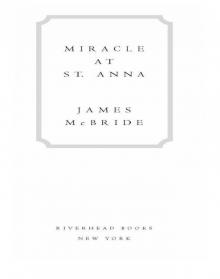 Miracle at St. Anna
Miracle at St. Anna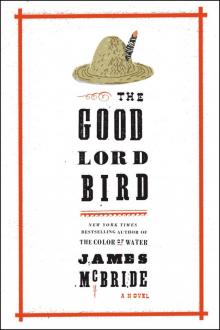 The Good Lord Bird
The Good Lord Bird Song Yet Sung
Song Yet Sung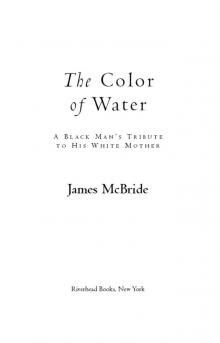 The Color of Water
The Color of Water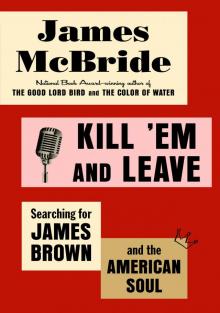 Kill 'Em and Leave
Kill 'Em and Leave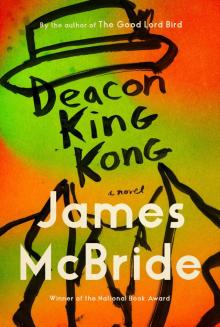 Deacon King Kong
Deacon King Kong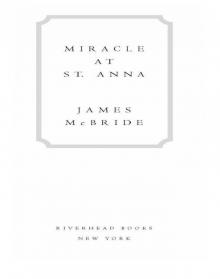 Miracle at St. Anna (Movie Tie-in)
Miracle at St. Anna (Movie Tie-in)